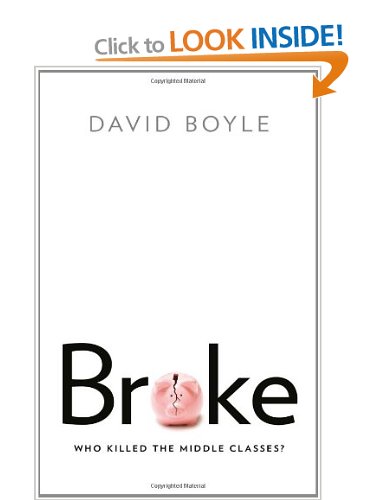Broke: Who Killed the Middle Classes? by David Boyle
 For a long time David Boyle has long been one of the smartest Liberal Democrat policy thinkers and one who isn’t easy to categorise on a simple left/right spectrum. He also – rarely for someone who revels in policy – has a fine turn of word, able to make complicated issues into highly readable books, as he has done again with his Broke: Who Killed the Middle Classes?
For a long time David Boyle has long been one of the smartest Liberal Democrat policy thinkers and one who isn’t easy to categorise on a simple left/right spectrum. He also – rarely for someone who revels in policy – has a fine turn of word, able to make complicated issues into highly readable books, as he has done again with his Broke: Who Killed the Middle Classes?
Pinning down quite who the ‘middle classes’ are is tricky and can disappear into long debates over methodological points. Boyle instead wisely goes for a broad brush description based on self-identification and symptomatic cultural clues, such as the middle class being the sort of people who go to musicals. (He doesn’t mention coffee, but the sort of people who put in coffee orders similar to those of the TV show Frasier’s Niles Crane would also fit Boyle’s categorisation.)
As Boyle points out, the fate of the middle class is important to anyone who values democracy as people with time, interest, skills and money to spare are vital to a functioning modern, developed democracy. It is such people who fuel the voluntary action and voluntary organisations necessary to make a democracy work in more than just name.
Although not quite up there with the tension of a genuine murder mystery, his tale is a very readable account of how Britain’s middle classes are under pressure and have lost many previous certainties (such as job security, professional development, ability to afford a new house and a decent pension). It is packed full of lovely passing comments, such as about the Victorian statisticians who tried to measure the morality of children by counting the number of hymns they knew by heart.
He effortlessly throws numerous provocative points at the reader, so silkily that it is easy to miss how controversial some are – and it also means (in my only real regret about the book) that where you disagree with him, there is not much in the way of substantive evidence to persuade you to change your mind. You either agree and nod along or disagree and don’t feel pushed to change you mind.
This is most notable in his take on the property market. He rightly points out how the idea of owning your own home is becoming a less and less achievable ideal, with renting now on the up again in the UK. Controversially, he suggests that the problem with house price inflation is not principally a shortage of supply pushing up prices but an excess of money fueling the price rises instead. Inflation may be a case of too much money chasing too few goods, but Boyle argues that for our property market, the problem is much more with the first and not the last part of that statement.
It’s an interesting thought, one at odds with what nearly everyone else says about the housing market – and one which suggests the current policy of trying to make it easier for people to borrow, so pumping more money into the housing system, will make matters worse, not better. A point of potentially major implications, but also one that David Boyle does not do that much to flesh out and present a detailed argument for. Instead, we get an interesting discourse on Victorian calculations of affordability of life in the 15th century. It makes for a fun, eclectic read. But also, if you are not immediately persuaded by his point, there is nothing there to make you change your mind.
Moreover, perhaps the answer to rising house prices for purchase is to embrace renting more warmly? In many other areas of life, Boyle likes what is done in Continental and Scandinavian countries. In many of those long-term renting is a respectable, normal aspiration to have (do you really want all the hassle of ownership when the roof starts leaking?). It would have been interesting to hear more about whether or not David Boyle wants to make renting become a middle class norm and if so,the policies to make this a good outcome.
The book ends with a series of ideas for rescuing the middle class, including a regular theme of David Boyle’s, that of rebuilding local institutions. One he does not mention is simply ‘move’. After all, an answer to pressing property prices in the suburbs of south east London is to move north to its lower property prices. Moving from, say, Croydon to Northern Ireland would be a massive leap, but I do wonder how much of the death of the middle classes Boyle talks about is really a southern England question that can be put down to many in the middle classes preferring class death where they live to prospering elsewhere. A fair choice for anyone to make, but also rather less of a tragedy.
Buy Broke: Who Killed the Middle Classes? by David Boyle here.
Note: a review copy of this book was provided to me by the publisher.
Interesting analysis. The question ‘why people dont move’ is discussed in Tim Harford’s book ‘ The Logic Of Life’. Specifically in the chapter ‘The World Is Spiky’.. Basically big cities are where innovations swirl round.
markpack Thank you so much for doing that! Worth waiting for too…
davidboyle1958 markpack I’ve not forgotten either!
davidboyle1958 Its a superb read!
theinetwork Thank you!